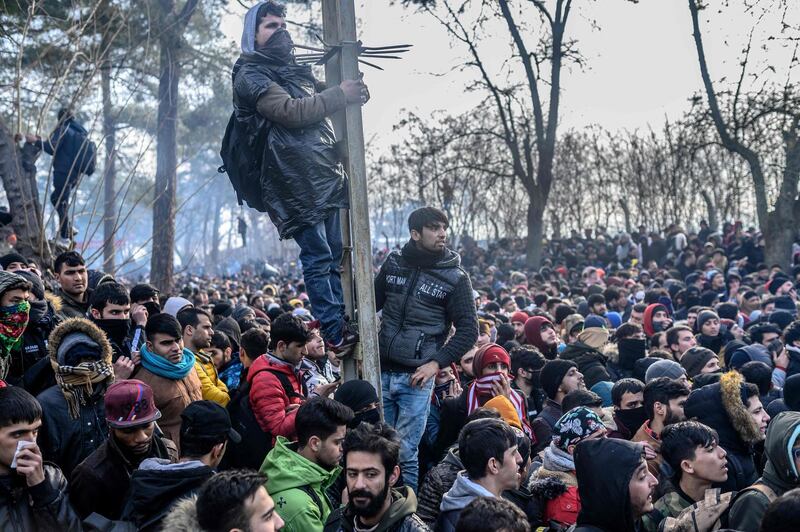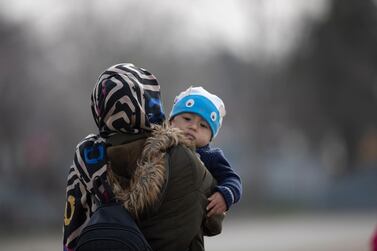When Ahmed fled Syria for Turkey in 2015, he knew life in his new home wouldn’t be easy.
But Ahmed, 27, did not expect to spend the next few years performing back-breaking, illegal work in fear of being sent back to the war zone from which he escaped.
After years of torment in the land that was supposed to offer safety, he is now among thousands hoping that President Recep Tayyip Erdogan’s order last week to open the country’s border with Greece will allow them passage to Europe.
"Syrians all over Turkey are unhappy. There are too many of us," Ahmed told The National as he poured Arabic coffee and handed out cakes at his sister's apartment in the southern Turkish city of Gaziantep.
“Even if you learn the language, the opportunities here are limited, and the Turkish government doesn't help us get into work or education.”
Ahmed is preparing to take the long bus journey from Gaziantep to Edirne in the north-west, and then on to the no-man’s land between Turkey and the EU in a bid for a new life.
Eight friends are already at the Pazarkule border point with Greece and are updating him on the situation, so he knows people are sleeping in the open in below freezing conditions and food and water are scarce.
But Ahmed says it is his only shot at a normal life.
Turkey, which divides the Middle East and Central Asia from Europe, has struggled under the strain of supporting the world’s largest refugee population.
It is home to 4 million registered refugees, among them more than 3.5 million Syrians, says the UN High Commission for Refugees.
Gaziantep’s population has grown by a life-altering 30 per cent since the start of the nine-year civil war just over the border.
Many of those hoping to get to Europe are from Afghanistan, Iran and North Africa, whose situations are not considered extreme enough to claim asylum in Turkey, and as a consequence have never legally registered there.
Syrians who spoke to The National said that although they were extremely grateful to Turkey for taking them in.
But with no prospect of being able to go home any time soon, they needed to begin new lives.
It is hard to settle when you are unable to find proper work and your travel is restricted outside the city in which you are registered.
And a change in public sentiment towards refugees as Turkey’s economy has struggled over the past few years has left people worried for their safety.
Dima Al Sayed, a Syrian journalist for Arabic language radio station Rozana FM, said from the EU border in the Turkish province of Edirne that the situation there was dire and that some had fallen sick.
“Many Syrians decided to hold back from making the journey to see what happens first," Al Sayed said.
"Some of them were worried that it was a trick and the buses would take them back to Idlib.

“Instability is the main reason people want to leave, however. They don’t feel like they can start lives here properly as they don’t feel they will stay.
"The Turkish government changes procedures every year and they cannot afford all the papers. They are always worried they will be sent back.”
The threat of violence also hangs heavily over the heads of Syrians still living in Turkey.
When 36 Turkish soldiers were killed recently in northern Syria, the Syrian community bore the brunt of the outrage. Syrian shop owners around the country reported being attacked by thugs.
Although Syrians are considered the more fortunate migrants as they are offered temporary protection status granting them access to services like schools and hospitals, they are often unable to take advantage of the benefits.
The registration system for Syrians requires them to apply for permits for work, but only 60,000 to 70,000 have been issued so far, the Research Centre on Asylum and Migration, or Igam, says in Ankara.
Rejected applicants are given no reason for their rejection.
This has left most forced to find illegal work, for which they are paid little and offered no protection. They risk deportation if they are caught.
Amnesty International reported 20 cases of unlawful forced returns between May 25 and September 13, 2019.
“All the returns were disguised as 'voluntary returns', the October 2019 report said.
"Refugees from Syria were misled or threatened into signing a form saying they were requesting to be sent to Syria."
Mr Erdogan's office did not respond to requests for comment from The National.
Under the terms of the controversial 2016 EU-Turkey immigration deal, Syrians must apply for a travel permit every time they wish to leave the city where they first registered, making it hard to keep in contact with family members and search for jobs.
“Because of the size of the population, only the very vulnerable among the displaced are being resettled, mostly to the US and Canada, and that has triggered people to try their luck at the border,” said Metin Corbatir, president of Igam.
“The main problem for Afghan people is registration. They and those from Iran and parts of Africa are considered economic migrants by the EU and Turkey, so it is hard to claim asylum.
"They have no access to education so must find informal work, for example in markets, and live on the margins of society trying to survive.”
Many Syrians struggle to live in worse conditions in Turkey than they did at home, and the regulations restrict their ability to change that.
“Those with permits can work regularly and use the social security system," Mr Corbatir said.
"But many work unregistered, at least one person in every family, and young boys are often taken out of school."
The life of an informal worker is tough. Ahmed spent two years working 14 to 16 hour days for 1,360 Turkish lira (Dh809) a month making clothes, shoes and fabric until his back became too damaged from hunching over a machine.
Then he was moved to a lower-paid role selling the factory’s wares at Gaziantep’s Iranian market, where he says he was regularly threatened for money by Turkish and Syrian gangs.
Expected to work until 7am during Eid and busy periods, Ahmed gave up the work after he discovered his employer had been lacing his cake with amphetamines to keep him awake, he claims.
He had been a third-year civil engineering student in Syria before the war halted his studies and forced him to take up work for a medical NGO.
Ahmed fled his home town of Deir Ezzor after ISIS arrested his father, and it took him six months to get to the border.
“Now I don’t care where I go, it makes no difference to me. I just want a secure life. We would all prefer to go home but that is not an option.”
Ahmed holds out hope that if he can get to Europe he can finish his studies and earn enough money to support his parents and sisters back in Turkey.
“My friend made it to Luxembourg last month after being smuggled out of Bodrum," he said.
"In Turkey, he became addicted to drugs due to the pressure of life here. He once told me he barely saw the sun for four years because of his factory work.
“Now he is clean and taking language lessons.”








